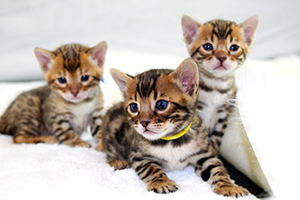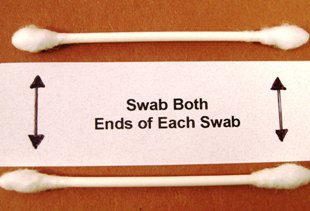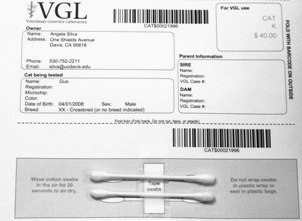Quick Summary
Click here for Price and Turnaround Time
Phenotype: Affected kittens may die at or soon after birth, but a few can appear clinically normal till about 5 months of age. These juveniles develop a persistent fever and later show signs of muscle tremors. The signs progress to generalized muscle atrophy and eventual death.
Mode of Inheritance: Autosomal recessive
Alleles: N = Normal, GSD = Glycogen storage disease type IV (GSD IV)
Breeds appropriate for testing: Norwegian Forest Cat
Explanation of Results:
- Cats with N/N genotype will not have glycogen storage disease type IV and cannot transmit this GSD IV variant to their offspring.
- Cats with N/GSD genotype will not have glycogen storage disease type IV, but are carriers. They will transmit this GSD IV variant to 50% of their offspring. Matings between two carriers are predicted to produce 25% kittens with glycogen storage disease type IV.
- Cats with GSD/GSD genotype will have glycogen storage disease type IV, a fatal condition.
Cat DNA tests are carried out using cells brushed from your cat's cheeks and gums using household cotton swabs.
The cat DNA submission form with instructions and a place to tape the cotton swabs is sent to you via email after you place an order, and can be printed from your home computer. DNA test kits are no longer mailed.
Instructions
Step-By-Step:
1.
 Purchase regular household cotton swabs for cat DNA collection (the cotton swabs can be purchased at a pharmacy or drug store)
Purchase regular household cotton swabs for cat DNA collection (the cotton swabs can be purchased at a pharmacy or drug store)
2.

Make sure the cat has not had anything to eat or drink for at least 1 hour prior to collecting sample.
When swabbing kittens, isolate each kitten from the mother, littermates and any shared toys for 1 hour prior to swabbing. Kittens should not have nursed or eaten for 1 hour prior to collecting sample.
If collecting samples from more than one cat, make sure to sample one cat at a time and wash your hands before swabbing another cat.
3.
 Use both ends of the two cotton swabs for a total of four swabs.
Use both ends of the two cotton swabs for a total of four swabs.
4.
Place the cotton head of the swab between the cat’s gums and cheek and rub or rotate the swab back and forth for 15 seconds. Repeat with each cotton swab head, for a total of 4 swabs. We recommend swabbing a different area of the gums with each swab head.
5.
Wave the swab in the air for 10-15 seconds to air dry it before attaching it to the submission form.
6.
 After swabbing the cheek and gums, tape the cotton swabs to the bar-coded submission form printed from your MyVGL account.
After swabbing the cheek and gums, tape the cotton swabs to the bar-coded submission form printed from your MyVGL account.
ATTENTION:
- Do not collect saliva/drool – the key to obtaining a good sample is getting cheek cells on the swab.
- Do not rub swab on the cat’s tongue or teeth – this will result in poor quality sample.
- Do not collect a sample from a kitten that has recently nursed – the mother’s genetic material can rub off on the kitten’s mouth and contaminate the sample.
Norwegian Forest cats can inherit a defective glycogen branching enzyme (GBE) that causes a severe error in glycogen (sugar) storage in cells. Abnormal glycogen accumulates in muscle, liver, and neurons causing progressive organ dysfunctions. The disease is inherited as an autosomal recessive trait. Most, affected kittens may die at or soon after birth likely from an inability to produce energy. In rare instances, some affected kittens appear clinically normal until about 5 months of age when normal development ceases. These juveniles develop a persistent fever and later show signs of muscle tremors. The signs progress to generalized muscle atrophy and eventual death.
Glycogen storage disease IV (GSD IV) in the Norwegian Forest Cat is inherited in an autosomal recessive fashion. Two affected copies are necessary for the disease to manifest and both sexes are affected with equal frequency. Testing for GSD IV can help breeders identify carriers of GSD IV in Norwegian Forest Cats and select mates for breeding to avoid producing affected kittens.
